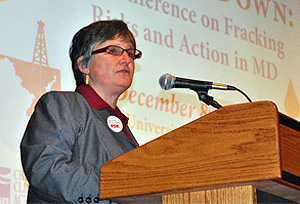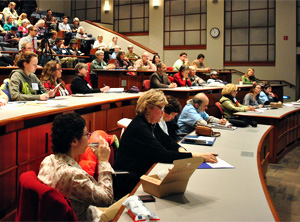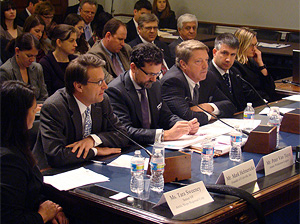Hydraulic fracturing (“fracking”) is unlocking unconventional oil and gas resources and transforming our energy profile. Within the last decade, we have seen a steady uptick in domestic oil and gas production, a dramatic drop in American natural gas prices, and the retirement of old coal plants forced out of the market by more efficient gas-fired energy. We’ve seen oil and gas production in places where it never before existed, and a remarkable scale and intensity of development.
 We often hear about the benefits of this energy “boom” – jobs created, reduction in air pollution, reduced dependence on foreign oil. Policy makers must also carefully consider and manage the potential serious risks posed by fracking to public health, the environment, and community character to minimize the potential for big problems down the road. Citizens have a role to play, to ask questions about the potential risks and to steer policy discussion towards solutions that are protective of human health and community welfare.
We often hear about the benefits of this energy “boom” – jobs created, reduction in air pollution, reduced dependence on foreign oil. Policy makers must also carefully consider and manage the potential serious risks posed by fracking to public health, the environment, and community character to minimize the potential for big problems down the road. Citizens have a role to play, to ask questions about the potential risks and to steer policy discussion towards solutions that are protective of human health and community welfare.
Influencing public policy on fracking
The first step is for citizens to become informed about what oil and gas development is proposed in or near their communities, and what that might means for their daily lives. Asking questions and expecting answers is one of the beauties of democracy.
More than this, there are opportunities for citizens to engage in the public policy process playing out at multiple levels of government—local, state, tribal and federal. For all the complications and imperfections of this process the take home message is that in a democratic society people have the opportunity to participate. Here are some suggestions of ways citizens can get involved in planning and decision-making; more ideas can be found in an informational toolkit on fracking recently released by UCS.
 Local government and fracking
Local government and fracking
It may come as a surprise to some that local governments can have a major influence on the development of oil and gas resources within their jurisdiction. But local governments are broadly responsible for zoning and land-use planning, and control local infrastructure and services (e.g. roads, public water sources, and waste water treatment facilities). Local governments hear the complaints associated with oil and gas operations, and are often in the best position to mitigate the problems with measures such as traffic routing and setback rules. Arlington, Texas, for instance, has imposed setback requirements for wells and prohibited noisier oil and gas activities from taking place between 6 pm and 7 am.
In many towns, discussion of unconventional oil and gas development will rest with the city or town council and mayor, and town boards dealing with planning, public health, and public works. Almost all governmental meetings in the United States are public. Planning Board or town council meetings, then, provide an opportunity for citizens to ask questions (see the UCS community toolkit) and register their concerns with local elected officials. While every town may not issue oil and gas permits, there will be opportunities to review town zoning, waste disposal, and infrastructure plans and consider how these might attract, manage, or discourage development.
State law can affect the extent of authority a local government has over activities within its borders. For instance, the Pennsylvania Constitution gives broad powers to local governments. So when the state legislature passed a bill to prohibit local governments from regulating or banning fracking, several towns challenged this law on constitutional grounds. The case is before the Pennsylvania Supreme Court now.
In other cases, state officials advocate expanding local government powers; for instance, Michigan legislators are proposing to allow local governments to request a public hearing before a state permit can be issued for fracking in their jurisdiction. Here is another place that citizens can weigh in, to make sure local governments have a voice in when, where, how, and whether fracking occurs.
State government and fracking
The lead oil and gas regulators operate at the state level. Each state establishes its own process and set of statutory and regulatory controls. When an oil or gas operator applies for a permit to drill, some states require that the public be notified. Fewer states allow some or all members of the public to comment on the proposed permit. If your state doesn’t provide for this, ask why not!
The information available to the public accompanying each permit application will vary substantially depending on state regulations. State agencies also write operating requirements for oil and gas development, and submit these proposals for public comment. The agency issuing the permit or writing the rules will vary, depending on the structure of state government. For example, in Texas, the Railroad Commission and the Commission on Environmental Quality share responsibility issuing permits and monitoring regulatory requirements. In Pennsylvania, the responsibility falls to the Department of Environmental Protection. In California, permitting is overseen by the Department of Conservation’s Division of Oil, Gas and Geothermal Resources.
State agencies sometimes engage in analyses to assess the cumulative environmental impact of proposed oil and gas activity. New York is conducting a Generic Environmental Impact Statement, and has received more than 200,000 public comments in the process. An environmental impact statement not only analyzes the potential effects of proposed development, but considers alternatives that might have different or lesser impacts. The process of preparing an environmental impact statement allows for not only greater public information, but much more extensive public comment on the broader questions of when and how development should occur.
Beyond commenting on permit applications, proposed rules, and impact studies—and encouraging others to do the same—citizens can also ask questions of state officials during public hearings, or in writing. And, of course, they can contact their elected officials, to urge them to proactively address fracking issues and provide meaningful opportunities for the public to participate.
 Federal government and fracking
Federal government and fracking
The federal government has the authority to regulate oil and gas development on federal lands, and on tribal lands in coordination with tribal governments. The federal government often plays a major backstop role on all lands to ensure the safety of drinking water (Safe Drinking Water Act), surface waters (Clean Water Act) and air quality (Clean Air Act) as well as thoughtful environmental planning (National Environmental Policy Act, NEPA). Unfortunately, the oil and gas industry enjoys effective exemptions from the requirements of these federal laws that apply to almost all other major development efforts.
Where it can act, the federal government must provide notice and opportunity for public comment on any rules it proposes. For instance, the Bureau of Land Management (BLM) has proposed regulations for fracking underway on federal lands, and is now reviewing the 2.2 million comments it received. Notices for upcoming public comment periods or public hearings are posted on agency websites, and on regulations.gov.
As at the state level, when the federal government prepares an environmental assessment or impact statement, the public is able to obtain information on development alternatives and to comment on those alternatives. Last month, prompted by the two lawsuits charging that BLM’s failure to conduct environmental assessment violated the NEPA, BLM began work on an Environmental Impact Statement for oil and gas leasing on federal lands in Central California.
On issues related to the federal role in managing the risks of fracking, contact your members of Congress (both House and Senate). Members of Congress are responsive to constituent concerns, and all Members have district offices (or state offices for Senators) so you can travel a relatively short distance to speak to your Member or their staff in person.
Speak up!
It is too easy to say that government doesn’t work the way we want it to. There are plentiful opportunities to engage. In a democracy, when we don’t think something works right, it is our right and and our obligation to use our voice to make a change.
